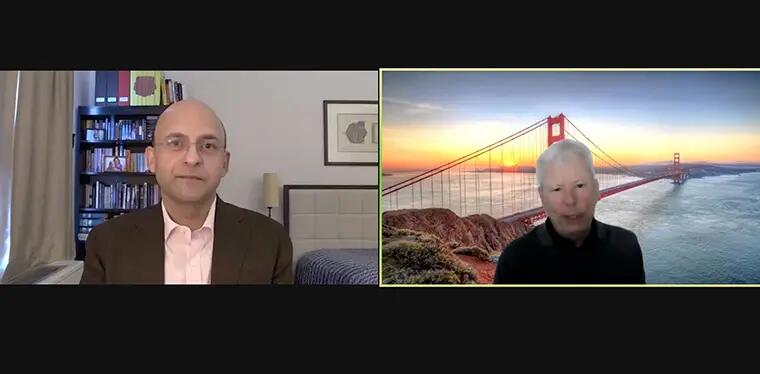
Rutgers University President Dr. Jonathan Holloway opened the keynote session featuring Professor Richard Thaler (upper right) and Taumur Hyat, (upper left) chief operating officer of PGIM.
Nobel Laureate Richard Thaler headlines behavioral finance conference
Rutgers Business School-Newark and New Brunswick held a virtual conference on behavioral finance that attracted several hundred participants from around the world. The highlight of the program was a keynote question-and-answer session featuring Richard Thaler, a Nobel Laureate from the Booth School of Business at the University of Chicago and a founder/principal of Fuller & Thaler Asset Management in San Mateo, California.
John Longo and Ron Richter, professors of professional practice in finance and economics at Rutgers Business School, served as co-organizers of the conference. Sponsors included NexGen Financial Group, the Financial Planning Association of New Jersey, John Wiley & Sons, as well as Rutgers Business School.
Rutgers University President Jonathan Holloway welcomed New Jersey native, Professor Richard Thaler, “home” in a virtual manner while summarizing the Nobel laureate’s life’s work. Dr. Holloway also introduced the moderator of Professor Thaler’s question and answer session, Taumur Hyat, who is chief operating officer of PGIM, the investment unit of Prudential Financial.
Dr. Hyat, who holds a Ph.D. in economics from Oxford University, deftly led Professor Thaler through a wide range of topics, including the COVID-19 vaccine rollout, climate change, the anomalous trading in GameStop, behavioral biases that may generate alpha for practitioners, and future areas of behavioral finance research.
In response to a question on “nudges” to help with vaccine hesitancy, Professor Thaler suggested dangling benefits akin to a health passport. For example, he suggested that people should be provided an electronic version of vaccine certification in order to get on an airplane, attend a baseball game, bar, and so forth. Professor Thaler believes that climate change problem is too big to be solved with nudges and favors traditional economic approaches, such as carbon tax and cap and trade proposals. He believes nudges can be a useful supplement to the climate problem. For example, apps could be created than set off bells when someone is consuming too much energy so that they may modify their behavior.
He compared the current market environment to the Internet Bubble of the late 1990s, with one important difference: Today many of the leading firms, such as Facebook, Microsoft, and Google are enormously profitable, in contrast to many of the market leading internet firms on the 1990s. He believes “in the long-term the market likes profits” and anticipates some type of shakeup with securities that emphasize value and quality outperforming at the expense of money losing firms with bad balance sheets. Professor Thaler believes that one reason for the rise of retail investors is simply boredom due to lockdown conditions spurred on by the COVID-19 pandemic. He predicted that the current strong retail interest in individual stocks will eventually go out of fashion.
When Dr. Hyat asked Professor Thaler his views on fruitful areas of behavioral finance research, Professor Thaler responded, “Make your research about the world and not about the literature.” He said, “Spend less time reading and more time thinking.”
Hear the entire conversation between Dr. Hyat and Professor Thaler on the Rutgers Business School-Newark and New Brunswick YouTube channel.

Tina Hay, founder and CEO of Napkin Finance and the bestselling author of a book by the same name, kicked off the conference. Her presentation was entitled, “The Power of Visual Learning and Finance.”
In her talk, Hay first discussed the history of visual learning, citing noteworthy examples, such as Einstein’s famous thought experiments of chasing a light beam at the speed of light. She then reviewed some of her “napkins” that explain complex financial concepts, such as the power of compound interest, in a visual format. The napkins had their roots from when she was a student at Harvard Business School trying to master intricate financial concepts, such as mortgage backed securities, with the aid of visual learning. The low performance of many young Americans on standardized tests in Math and Science were partially the result of using rote memorization techniques, rather than a more active, visual approach to learning used by many other countries, such as Singapore, she explained.
She concluded her lecture by stating that “truly anyone can be a numbers person with the aid of visualization.”
Hay’s lecture was followed by an engaging practitioner panel of Certified Financial Planners moderated by Professor Richter. The panel focused on how behavioral biases impact a clients’ financial planning process. As one panelist said, “It is the financial planner’s role to listen to client’s biases towards money and take out the noise associated with these biases contributing to a client not achieving their financial goals.” It was discussed that biases like anchoring, herding and risk aversion will deter from a client’s financial goals and will result in them not realizing the financial success they are looking to achieve.
Harrison Hong, the John R. Eckel, Jr. Professor of Financial Economics at Columbia University, delivered a very timely lecture, “Pandemics, Vaccines, and Corporate Earnings.” Professor Hong was previously recognized by the American Finance Association with the Fischer Black Prize, given biennially to a financial economics scholar under the age of 40 for significant original research that is relevant to finance practice.
In his lecture, Professor Hong discussed how analyst’s earnings estimates changed as the COVID-19 pandemic dramatically accelerated in the U.S. in early 2020. In some cases, he noted that “analysts were more accurate than the epidemiologists” in predicting the pandemic’s path. His paper included an earnings damage function based on the clinical success of a COVID-19 vaccine, FDA approval, and an effective vaccine rollout. His findings suggest that earnings may start to approach normalcy sometime in the Spring of 2021.
Parul Jain, a professor of professional practice in finance and economics at Rutgers Business School, delivered another timely lecture entitled, “Bubble Dynamics.” Dr. Jain studied under the famed behavioral economist, Hyman Minsky, while obtaining her doctoral degree at Washington University in St. Louis. In her lecture, Professor Jain discussed the history of bubbles as well as the anatomy of a typical bubble formation and its dissipation. Professor Jain noted, “Spotting market tops with strong tailwinds in individual markets are problematic.”
Regarding the GameStop trading controversy, Professor Jain noted the “The market is not quite as liquid as it would seem” which often prevents short sellers from driving irrational prices back down to their fundamental values. She cited John Maynard Keynes’ famous quote, “The market can stay irrational longer than you can stay solvent.”
The second panel discussion, also moderated by Professor Richter, focused on how investment strategies changed (or stayed the same) during the pandemic. This topic led to a very interesting dialogue in the wake of the COVID-19 pandemic and the increased volatility of the equity markets. All the panelists agreed that having more communication with the clients during these times has been vital in keeping their clients on track to meeting their long-term financial goals. Panelist Marinela Collado said you cannot over communicate in these times with your clients for the purpose of mitigating the panic associated with initial impact of COVID-19. As most of their clients did not sell out of the market, they all stated that some of the conversations were difficult in that clients were nervous as they saw the investment balances decrease in March of 2020. However, staying the course with a long-term investment strategy proved to be effective in the last 10 months.
Professor Longo and his son, Tyler Longo, delivered a keynote lecture, “Lessons on Behavioral Finance from Warren Buffett,” related to their recently published book by John Wiley & Sons, Buffett's Tips: A Guide to Financial Literacy and Life. The authors discussed how many of Buffett’s actions demonstrate a keen understanding of behavioral finance. For example, one of Buffett’s most famous quotes – “Be fearful when others are greedy. Be greedy when others are fearful” – is at the heart of behavioral finance.
Hear the entire talk by John and Tyler Longo about the wisdom of Warren Buffett.
Professor Longo tied Buffett’s quote to the overreaction and underreaction anomalies in the behavioral finance literature. Tyler Longo noted Buffett’s aversion to Bitcoin since it lacks intrinsic value, but noted it doesn’t mean Bitcoin has no value, citing high prices paid for works of art that provide no cash flow. Regarding the GameStop trading anomaly, the authors cited two of Buffett’s tips from their book: 1.) “Don’t sell short. It’s too difficult.” 2.) “A pin lies in wait for every bubble.”
The conference closed with an interactive discussion among the participants, moderated by Professors Richter and Longo.
- John Longo
Press: For all media inquiries see our Media Kit


